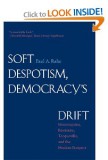Soft Despotism, Democracy's Drift: Montesquieu, Rousseau, Tocqueville, and the Modern Prospect

|
Title | Soft Despotism, Democracy’s Drift: Montesquieu, Rousseau, Tocqueville, and the Modern Prospect |
| Author | Paul A. Rahe | |
| Reviewer | S. T. Karnick | |
| Review Date | December 03, 2010 | |
| Publisher | Yale University Press | |
| Year | 2010 | |
| Rate this Book |
The current national debate over the role of government has critical implications for philanthropy, as the answer will determine whether the melioration of social ills will be pursued primarily through voluntary associations and actions or by the state through the political process. As the debate over the health-care reform bill demonstrated, government programs to bring about equality among the citizenry cannot work if people can opt out, and thus any potential challenge to government’s hegemony must be forcefully rejected. That, of course, shrinks the space for all forms of voluntary action.
This is a central theme of Paul A. Rahe’s new book, Soft Despotism, Democracy’s Drift, as Rahe examines three French Enlightenment thinkers’ struggles with the problem democracy seems inevitably to pose: the pursuit of the good through government destroys mediating institutions and confines free endeavor into an ever-smaller space. This has grave consequences for society, Rahe notes in discussing the French writer Alexis de Tocqueville. Where voluntary associations are abundant, Rahe quotes Tocqueville as observing, “sentiments and ideas renew themselves, the heart expands and the human mind (esprit) develops for no other reason than because of the reciprocal action of men upon one another” (209). Thus, confirmed Toqueville, for people “to remain or become civilized, it is necessary that among them the art of association develop and perfect itself in the same measure in which equality of conditions grows” (209).
Rahe, a professor at Hillsdale College, begins his book with an extensive account and analysis of Montesquieu’s Spirit of Laws, a foundational book of modern political thought. Montesquieu posits that the animating principle behind democratic republics is virtue. However, Rahe notes, the Enlightenment thinker understood a need for moderation even in government’s pursuit of virtue. He quotes Montesquieu as observing, “Even virtue has a need for limits” (15).
Montesquieu avoided making a prescriptive politics explicit, Rahe notes, but that is exactly what his follower Jean-Jacques Rousseau set out to provide. In so doing, Rahe argues, Rousseau planted the seeds of much subsequent mayhem:
[H]e fomented the revolutionary and the nationalistic impulses and the democratic envy that he so frequently professed to abhor; and by insisting that men are naturally good and that all of the wickedness they display and all of the misery they suffer can be traced to the political institutions under which they live, he fostered within what was in origin a secular impulse an almost messianic hope, and he inspired in many a reader a profound longing to establish new institutions capable of transforming the human condition and of reworking thereby the very nature of man (139).
Thus Rousseau’s thinking led—in France most spectacularly but also in other European nations and eventually the Americas—to a catastrophe against which Montesquieu had explicitly warned: the abolition of intermediary bodies between the sovereign and the citizen.
This was a special concern of Alexis de Tocqueville, the third thinker whom Rahe takes up at length. In Democracy in America Tocqueville reported finding “little . . . in the way of a guarantee against tyranny” in the United States in the 1830s (171). Rahe notes Tocqueville’s concern that majority rule corrupts the polity:
Tocqueville seriously doubted whether there could be any effective checks on the influence that the majority in a strictly egalitarian polity exercises over the human mind. As he knew all too well, majority rule is based on the utterly preposterous assumption that with numbers come “enlightenment and wisdom.” He saw as well that this doctrine, “the theory of equality applied to intelligence,” . . .confers on public opinion a species of “moral imperium” (171-172).
In democracies there is only one final authority: public opinion, “and in this species of servitude Tocqueville discerns nothing salutary at all,” Rahe observes (176). The sovereign power, Tocqueville wrote, “renders the employment of free will less useful and more rare (every day); it confines the action of the will within a smaller space, and bit by bit it steals from each citizen the use of that which is his own” (188). Ultimately, he concluded, “it reduces every nation to nothing but a herd of timid and industrious animals, of which the government is the shepherd” (188). This is the “soft despotism that would degrade men without tormenting them,” in Tocqueville’s vivid and oft-repeated words (186). It is, Rahe writes, “democracy’s drift” (193).
The genius of America’s founders was in establishing what proved to be the most powerful check on the naturally expanding power of government: the premise of individual rights given by the divine Creator. This made the individual into a special being who is ultimately sovereign over him- or herself. That put a fairly definite limit on what government could rightly do, and the Founders designed the nation’s Constitution accordingly. The separation of powers was part of it, but even more important, in Tocqueville’s view, was the principle of federalism, or subsidiarity—the placement of the vast majority of decision-making authority with the states and individuals, not the central government. Rahe writes, “In practice, this meant that on the local level Americans were more or less autonomous. They were not alone and defenseless in the face of a mass society; they lived in small communities. With the state government, they had limited contact; with the national government, they had almost none” (196). That left space for a proliferation of voluntary institutions, which Tocqueville praised effusively.
Tracing democracy’s drift a century later, Rahe argues that as Christianity declined in the United States progressives such as Herbert Croly, Walter Lippmann, John Dewey, and their associates “aimed at the foundation of a new political regime, distinct from and, in certain critical respects, opposed to the one that had gradually taken shape in the period stretching from 1776 to 1789, which Lincoln later strove mightily to defend” (245). Progressive-era U.S. presidents Theodore Roosevelt and Woodrow Wilson ignored the principles of the Founders and set about centralizing the government and redesigning it along lines they considered more rational and modern. The welfare state rose and was steadily consolidated in the decades since, continually eroding the ground on which voluntary institutions had stood.
Today, Rahe writes, “we live . . . with an untidy compromise” between the progressive and constitutionalist points of view (257). Although the states exist, and we still have school boards, local governments, and the like,
they take their orders from a national government that offers them vast sums in funding in return for strict compliance with its every whim. . . . [W]ith every passing year the burden of regulation becomes more intolerable and the number of mandates with increasing rapidity grows. . . . With every passing year, in every sphere of life, uniformity becomes more pervasive, and individual Americans have less and less control over the decisions that shape their lives (257-258).
That applies to voluntary institutions as well—crowded out by expansion of government. Rahe calls for a reversal of the growth of government, and he recommends that reforms of the national government be based on three principles: government should “do no harm,” subsidiarity, and individual rights. This would lead naturally to a central role for voluntary action in the melioration of perceived social problems. Rahe concludes:
We can be what once we were, or we can settle for a gradual, gentle descent into servitude. It is high time that we reclaim what is, after all, our legacy as Americans, for the genuine self-government that we once enjoyed in plenitude is a possession wholly consonant with our dignity as human beings and with our rights as women and men (280).
Echoing Tocqueville, Rahe argues that government’s displacement of voluntary institutions undermines “the morals and intelligence” of both the people and the business world, and that such a people ultimately become unfit to govern themselves. However, he and the French writer both note that the natural human desire for control over one’s destiny makes individuals prefer to “take responsibility for one’s own well-being and that of one’s family and local community” and motivates people to resist “the soft despotism that is democracy’s drift” (279). Such resistance may itself become a form of philanthropy.
S. T. Karnick is director of research for The Heartland Institute (http://www.heartland.org) and editor of The American Culture (http://culture.stkarnick.com).



